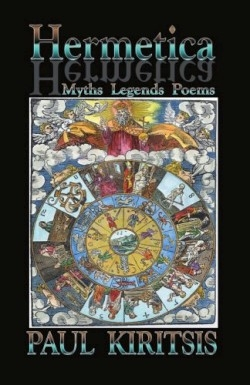Hermetica
Myths, Legends, Poems
Disparate cultures around the world have similar stories and myths about the exploits of their gods and heroes. Joseph Campbell said one explanation for these similarities is that “the human psyche is essentially the same all over the world…[and] out of this common ground have come what Jung has called archetypes, which are the common ideas of myths.” Author Paul Kiritsis has tapped into a vein overflowing with the ichors of archetypes. He has transcribed the magical essence of traditional oral storytelling on paper, which is no small feat.
Hermetica is comprised of two parts. The first part, “Poetics,” contains six separate sections of poetry—“Alchemica,” “Astrologica,” “Mythologica,” “Philosophica,” “Musica,” and “Erotica.” The book’s second part, “Verse Drama,” includes a retelling of the story of the Egyptian god Osiris in an epic poetical narrative reminiscent of Homer’s The Iliad. It also adds new twists to other myths, including “The Battle of Amun-Re and Isis” and “The Contendings of Hathor and Anti.” Kiritsis also includes a clever alternate version of Snow White called “The Flawed Mirror,” a story that deals with the interactions between the witch and her mirror. When the witch notices large cracks in the mirror, Kiritsis writes:
WITCH: That is odd. Those fractures were not there before.
MIRROR: No, they have always been there. Perhaps in your ignorance, you have never noticed them.
WITCH: So man is a mirror of the universe, is he not?
MIRROR: Quite so.
In these scant lines the author reveals the importance and powers of myth, alchemy and magic as a reflection of the modern reader’s struggles with the psychology and philosophy of a de-humanized twenty-first century Western society.
The author’s poetry in the “Poetics” section is less successful. It is filled with forced rhyme and rhythms, and simply doesn’t work as entertainment or enlightenment. As a practitioner of alchemy and magic the author’s main goal is to create an ode to love. While this is an ambitious endeavor, the clumsiness of the verse takes away from the overall meaning of his work. Kiritsis also provides photographs that are designed to enhance the beauty of the verses, but they end up being a distraction to the reader because of their poor quality.
Despite its shortcomings, Kiritsis’s book takes readers on a hermetic and orphic journey into the past to explore the myths that are building blocks of the human psyche.
Disclosure: This article is not an endorsement, but a review. The publisher of this book provided free copies of the book and paid a small fee to have their book reviewed by a professional reviewer. Foreword Reviews and Clarion Reviews make no guarantee that the publisher will receive a positive review. Foreword Magazine, Inc. is disclosing this in accordance with the Federal Trade Commission’s 16 CFR, Part 255.

